Unit 1 Relationships Lesson 1 Teachers 课件(共20张PPT)-2025-2026学年北师大版(2019)选择性必修第一册
文档属性
| 名称 | Unit 1 Relationships Lesson 1 Teachers 课件(共20张PPT)-2025-2026学年北师大版(2019)选择性必修第一册 |  | |
| 格式 | pptx | ||
| 文件大小 | 173.0KB | ||
| 资源类型 | 教案 | ||
| 版本资源 | 北师大版(2019) | ||
| 科目 | 英语 | ||
| 更新时间 | 2025-07-28 17:24:24 | ||
图片预览

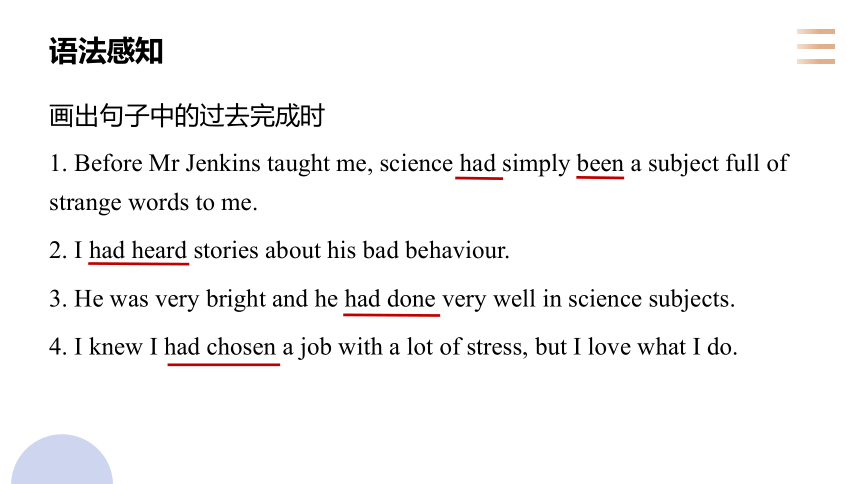
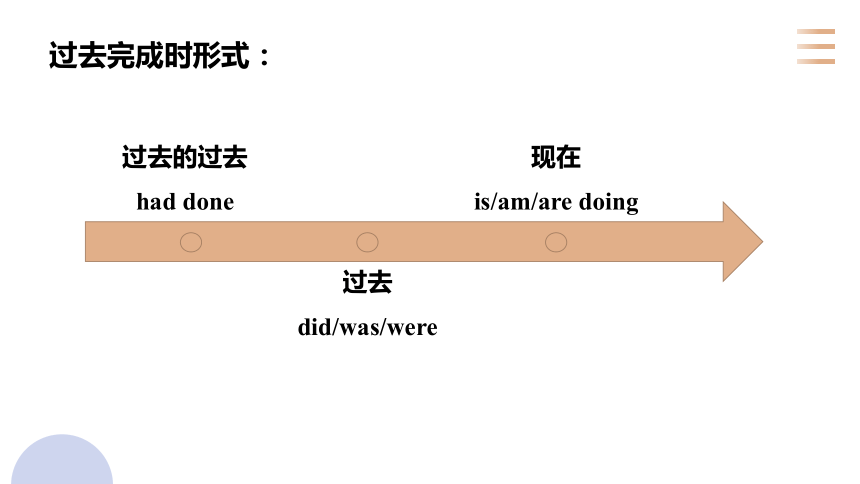
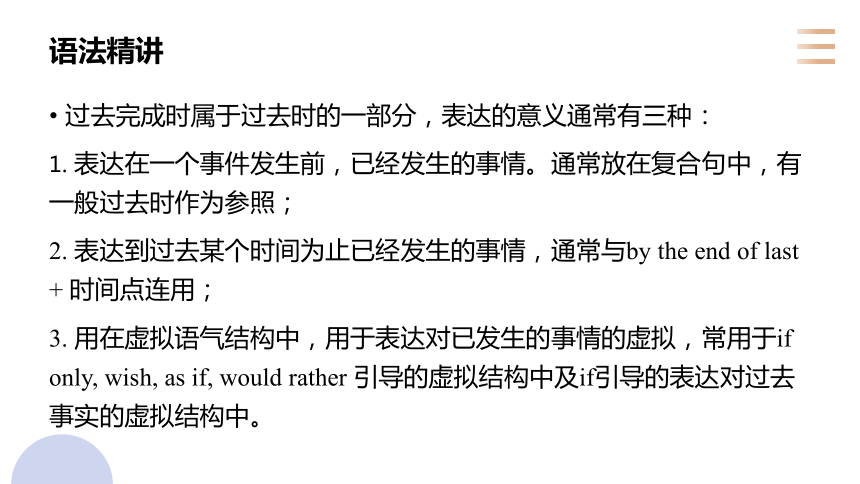
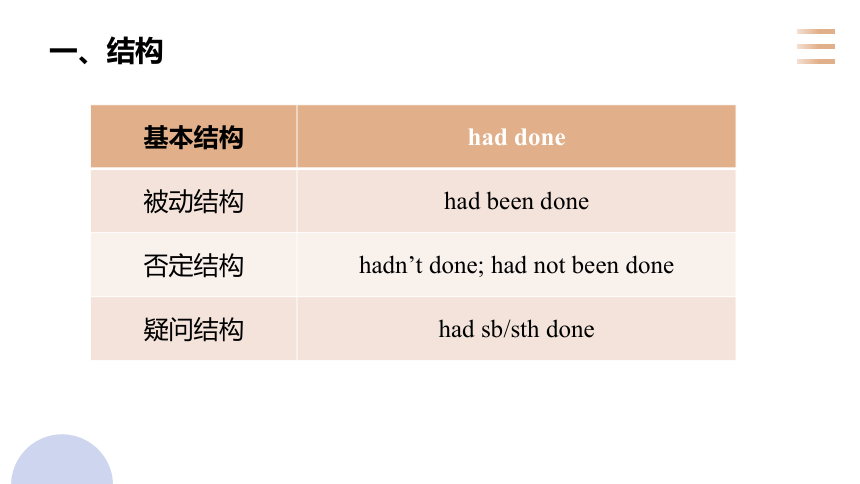
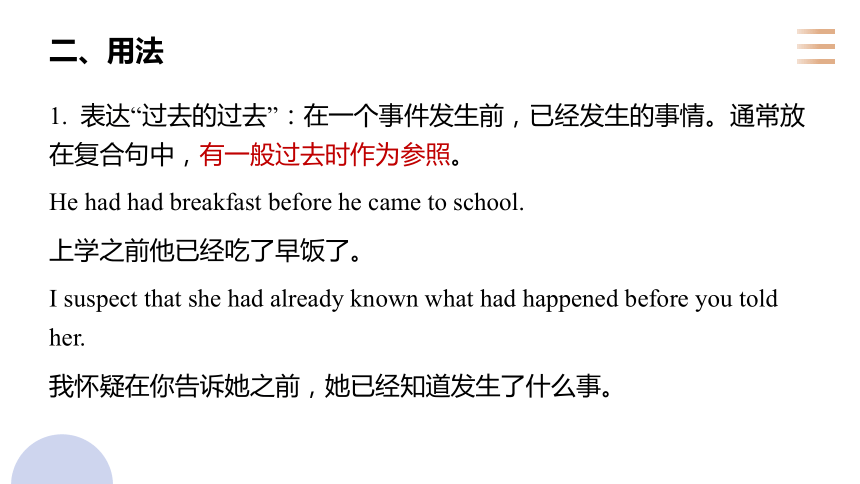
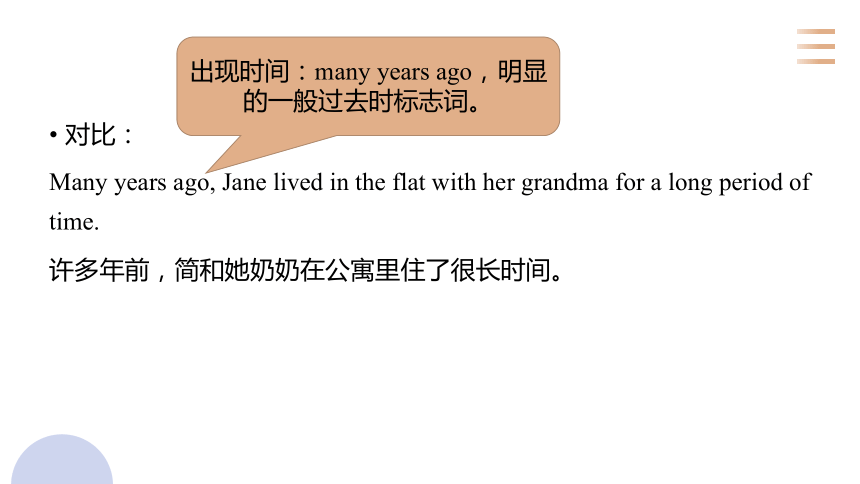
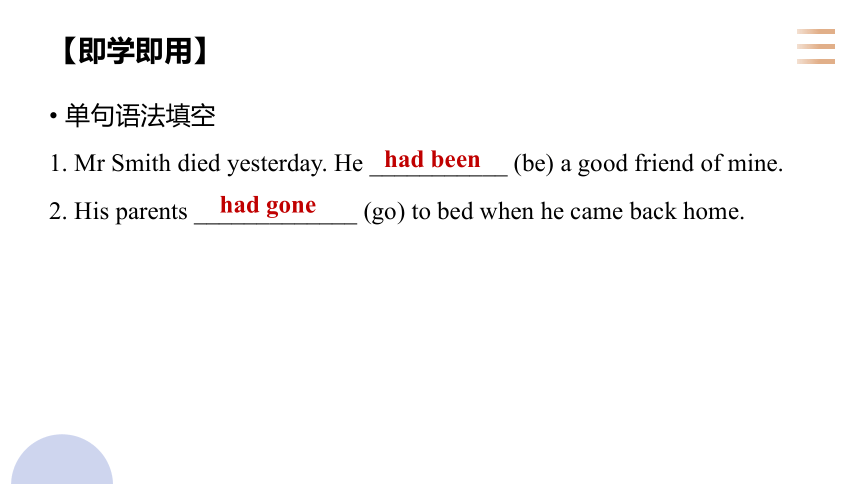
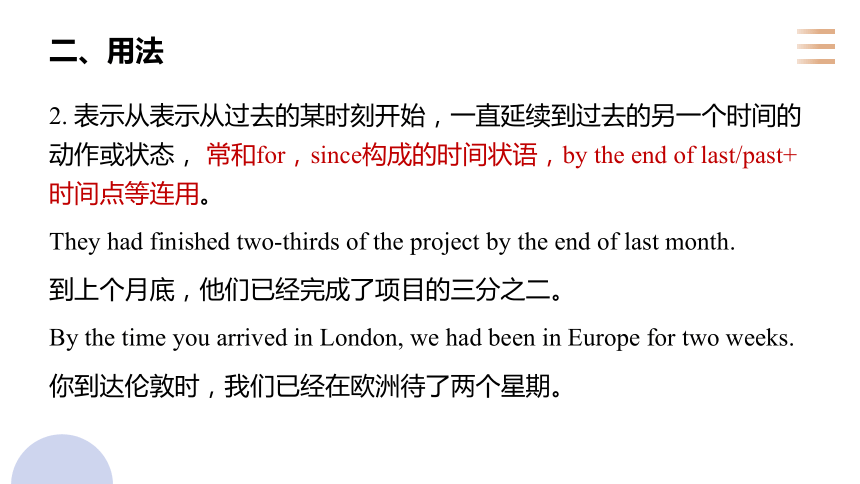
文档简介
(共20张PPT)
过去完成时
《北师大版2019》选修一
Unit1 Lesson1 语法
语法感知
画出句子中的过去完成时
1. Before Mr Jenkins taught me, science had simply been a subject full of strange words to me.
2. I had heard stories about his bad behaviour.
3. He was very bright and he had done very well in science subjects.
4. I knew I had chosen a job with a lot of stress, but I love what I do.
过去完成时形式:
过去的过去
had done
过去
did/was/were
现在
is/am/are doing
语法精讲
过去完成时属于过去时的一部分,表达的意义通常有三种:
1. 表达在一个事件发生前,已经发生的事情。通常放在复合句中,有一般过去时作为参照;
2. 表达到过去某个时间为止已经发生的事情,通常与by the end of last + 时间点连用;
3. 用在虚拟语气结构中,用于表达对已发生的事情的虚拟,常用于if only, wish, as if, would rather 引导的虚拟结构中及if引导的表达对过去事实的虚拟结构中。
一、结构
基本结构 had done
被动结构 had been done
否定结构 hadn’t done; had not been done
疑问结构 had sb/sth done
二、用法
1. 表达“过去的过去”:在一个事件发生前,已经发生的事情。通常放在复合句中,有一般过去时作为参照。
He had had breakfast before he came to school.
上学之前他已经吃了早饭了。
I suspect that she had already known what had happened before you told her.
我怀疑在你告诉她之前,她已经知道发生了什么事。
对比:
Many years ago, Jane lived in the flat with her grandma for a long period of time.
许多年前,简和她奶奶在公寓里住了很长时间。
出现时间:many years ago,明显的一般过去时标志词。
【即学即用】
单句语法填空
1. Mr Smith died yesterday. He ___________ (be) a good friend of mine.
2. His parents _____________ (go) to bed when he came back home.
had been
had gone
二、用法
2. 表示从表示从过去的某时刻开始,一直延续到过去的另一个时间的动作或状态, 常和for,since构成的时间状语,by the end of last/past+时间点等连用。
They had finished two-thirds of the project by the end of last month.
到上个月底,他们已经完成了项目的三分之二。
By the time you arrived in London, we had been in Europe for two weeks.
你到达伦敦时,我们已经在欧洲待了两个星期。
对比:
1. He said he had worked in that factory since 2008.
他说从2008年开始他就在那家工厂工作。
He has worked in that factory since 2008.
2. It was said that he had lived in the apartment for the last few decades.
据说过去几十年他一直住在那个公寓里。
He has lived in the apartment for the last few decades.
【即学即用】
单句语法填空
1. By nine o’clock last night, we __________ (get) 200 pictures from the spaceship.
2. I __________(be) at the bus stop for 20 minutes when a bus finally came.
3. We ___________________ (learn) over two thousand English words over the last few months.
had got
had been
had learned / learnt
二、用法
3. hardly...when... ,no sooner...than.... 以及 It was the first (second,etc.) time (that)...句型中。
Hardly had he I begun to speak when the audience interrupted him.
他刚开始演讲,听众就打断了他。
No sooner had he arrived than he went away again. 他刚到就又走了。
It was the third time that he had been out of work that year.
这是他那一年第三次失业了。
【即学即用】
单句语法填空
1. It was the first time that he ____________ (be) late for school.
2. I had hardly opened the door when a cat ____________ (rush) into my house.
had been
rushed
二、用法
4. 虚拟语气
(1) if only, wish, as if, as though及would rather引导的虚拟,表达与已发生过的事情相反的愿望。
I would rather you hadn’t been abroad at all. 我宁愿你没有出过国。
I went to bed early last night, but I wish I hadn’t done so.
我昨晚很早睡,但我真希望我没有那么做。
二、用法
4. 虚拟语气
(2) if 引导的表达对过去事实的虚拟
I didn’t see your sister at the meeting. If she had been there, she would have met my brother.
我没有在会议上见到你妹妹。如果她去了那里,她一定会见到我弟弟。
【即学即用】
单句语法填空
1. You didn’t let me drive. If we _____________ (drive) in turn,you wouldn’t have been so tored.
2. This device operated well as though it _________________ (repair).
had driven
had been repaired
【随堂练习】
一、用所给词的适当形式填空
1. The police ___________ (arrest) the man who ___________ (break) into a jewellery shop.
2. The whole class ___________ (cheer) for John because he __________ (win) an award.
3. My car ___________ (break) down on the way to the beach because it ___________ (run) out of petrol.
arrested
had broken
cheered
had won
broke
had run
【随堂练习】
4. The dog ________ (hide) under the sofa because it __________ (eat) the family dinner.
5. Hardly _______ he ________ (strat) the car when it ________ (break) down.
6. I lost all my money. If only I hadn’t _______ (be) that simple-minded.
7. If you ___________(go) over all your notes, you would have passed the exam.
hid
had eaten
had started
broke
been
had gone
【随堂练习】
二、给下列句子选择正确的时态
1. The movie ( has begun / had begun / began ) before we arrived.
2. We hadn’t seen each other since he ( left / has left / had left ) Nanjing.
3. I wish you ( have / had ) not been here.
4. No sooner ( has / had ) he gone out than it started to rain.
5. I was told that it was the last time they ( had seen / have seen / saw ) him.
Thank You
过去完成时
《北师大版2019》选修一
Unit1 Lesson1 语法
语法感知
画出句子中的过去完成时
1. Before Mr Jenkins taught me, science had simply been a subject full of strange words to me.
2. I had heard stories about his bad behaviour.
3. He was very bright and he had done very well in science subjects.
4. I knew I had chosen a job with a lot of stress, but I love what I do.
过去完成时形式:
过去的过去
had done
过去
did/was/were
现在
is/am/are doing
语法精讲
过去完成时属于过去时的一部分,表达的意义通常有三种:
1. 表达在一个事件发生前,已经发生的事情。通常放在复合句中,有一般过去时作为参照;
2. 表达到过去某个时间为止已经发生的事情,通常与by the end of last + 时间点连用;
3. 用在虚拟语气结构中,用于表达对已发生的事情的虚拟,常用于if only, wish, as if, would rather 引导的虚拟结构中及if引导的表达对过去事实的虚拟结构中。
一、结构
基本结构 had done
被动结构 had been done
否定结构 hadn’t done; had not been done
疑问结构 had sb/sth done
二、用法
1. 表达“过去的过去”:在一个事件发生前,已经发生的事情。通常放在复合句中,有一般过去时作为参照。
He had had breakfast before he came to school.
上学之前他已经吃了早饭了。
I suspect that she had already known what had happened before you told her.
我怀疑在你告诉她之前,她已经知道发生了什么事。
对比:
Many years ago, Jane lived in the flat with her grandma for a long period of time.
许多年前,简和她奶奶在公寓里住了很长时间。
出现时间:many years ago,明显的一般过去时标志词。
【即学即用】
单句语法填空
1. Mr Smith died yesterday. He ___________ (be) a good friend of mine.
2. His parents _____________ (go) to bed when he came back home.
had been
had gone
二、用法
2. 表示从表示从过去的某时刻开始,一直延续到过去的另一个时间的动作或状态, 常和for,since构成的时间状语,by the end of last/past+时间点等连用。
They had finished two-thirds of the project by the end of last month.
到上个月底,他们已经完成了项目的三分之二。
By the time you arrived in London, we had been in Europe for two weeks.
你到达伦敦时,我们已经在欧洲待了两个星期。
对比:
1. He said he had worked in that factory since 2008.
他说从2008年开始他就在那家工厂工作。
He has worked in that factory since 2008.
2. It was said that he had lived in the apartment for the last few decades.
据说过去几十年他一直住在那个公寓里。
He has lived in the apartment for the last few decades.
【即学即用】
单句语法填空
1. By nine o’clock last night, we __________ (get) 200 pictures from the spaceship.
2. I __________(be) at the bus stop for 20 minutes when a bus finally came.
3. We ___________________ (learn) over two thousand English words over the last few months.
had got
had been
had learned / learnt
二、用法
3. hardly...when... ,no sooner...than.... 以及 It was the first (second,etc.) time (that)...句型中。
Hardly had he I begun to speak when the audience interrupted him.
他刚开始演讲,听众就打断了他。
No sooner had he arrived than he went away again. 他刚到就又走了。
It was the third time that he had been out of work that year.
这是他那一年第三次失业了。
【即学即用】
单句语法填空
1. It was the first time that he ____________ (be) late for school.
2. I had hardly opened the door when a cat ____________ (rush) into my house.
had been
rushed
二、用法
4. 虚拟语气
(1) if only, wish, as if, as though及would rather引导的虚拟,表达与已发生过的事情相反的愿望。
I would rather you hadn’t been abroad at all. 我宁愿你没有出过国。
I went to bed early last night, but I wish I hadn’t done so.
我昨晚很早睡,但我真希望我没有那么做。
二、用法
4. 虚拟语气
(2) if 引导的表达对过去事实的虚拟
I didn’t see your sister at the meeting. If she had been there, she would have met my brother.
我没有在会议上见到你妹妹。如果她去了那里,她一定会见到我弟弟。
【即学即用】
单句语法填空
1. You didn’t let me drive. If we _____________ (drive) in turn,you wouldn’t have been so tored.
2. This device operated well as though it _________________ (repair).
had driven
had been repaired
【随堂练习】
一、用所给词的适当形式填空
1. The police ___________ (arrest) the man who ___________ (break) into a jewellery shop.
2. The whole class ___________ (cheer) for John because he __________ (win) an award.
3. My car ___________ (break) down on the way to the beach because it ___________ (run) out of petrol.
arrested
had broken
cheered
had won
broke
had run
【随堂练习】
4. The dog ________ (hide) under the sofa because it __________ (eat) the family dinner.
5. Hardly _______ he ________ (strat) the car when it ________ (break) down.
6. I lost all my money. If only I hadn’t _______ (be) that simple-minded.
7. If you ___________(go) over all your notes, you would have passed the exam.
hid
had eaten
had started
broke
been
had gone
【随堂练习】
二、给下列句子选择正确的时态
1. The movie ( has begun / had begun / began ) before we arrived.
2. We hadn’t seen each other since he ( left / has left / had left ) Nanjing.
3. I wish you ( have / had ) not been here.
4. No sooner ( has / had ) he gone out than it started to rain.
5. I was told that it was the last time they ( had seen / have seen / saw ) him.
Thank You
同课章节目录
- Unit 1 Relationshis
- Lesson 1 Teachers
- Lesson 2 How Do We Like Teachers’ Feedback?
- Lesson 3 So Close,Yet So Fa
- Unit 2 Success
- Lesson 1 Money vs Success
- Lesson 2 Top Five Secrets of Success
- Lesson 3 Getting to the Top
- Unit 3 Conservation
- Lesson 1 The Sixth Extinction
- Lesson 2 War on Plastic Packets
- Lesson 3 The Road to Destruction
